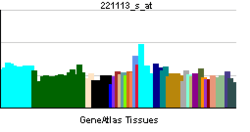WNT16
Protein Wnt-16 is a protein that in humans is encoded by the WNT16 gene.[1][2] It has been proposed that stimulation of WNT16 expression in nearby normal cells is responsible for the development of chemotherapy-resistance in cancer cells.[3]
The WNT gene family consists of structurally related genes that encode secreted signaling proteins. These proteins have been implicated in oncogenesis and in several developmental processes, including regulation of cell fate and patterning during embryogenesis. This gene is a member of the WNT gene family. It contains two transcript variants diverging at the 5' termini. These two variants are proposed to be the products of separate promoters and not to be splice variants from a single promoter. They are differentially expressed in normal tissues, one of which (variant 2) is expressed at significant levels only in the pancreas, whereas another one (variant 1) is expressed more ubiquitously with highest levels in adult kidney, placenta, brain, heart, and spleen.[2]
WNT16B expression is regulated by nuclear factor of κ light polypeptide gene enhancer in B cells 1 (NF-κB) after DNA damage, as can occur to normal cels during radiation or chemotherapy. Subsequently WNT16B signals in a paracrine manner to activate the Wnt expression program in tumor cells. The expression of WNT16B in the tumor microenvironment attenuates the effects of cytotoxic chemotherapy in vivo, promoting tumor cell survival and disease progression. This implies a mechanism by which cycles of genotoxic therapy might enhance subsequent treatment resistance in the tumor microenvironment.[3]
References
- ↑ McWhirter JR, Neuteboom ST, Wancewicz EV, Monia BP, Downing JR, Murre C (Oct 1999). "Oncogenic homeodomain transcription factor E2A-Pbx1 activates a novel WNT gene in pre-B acute lymphoblastoid leukemia". Proc Natl Acad Sci U S A 96 (20): 11464–9. doi:10.1073/pnas.96.20.11464. PMC 18056. PMID 10500199.
- ↑ 2.0 2.1 "Entrez Gene: WNT16 wingless-type MMTV integration site family, member 16".
- ↑ 3.0 3.1 Sun, Yu et al. Treatment-induced damage to the tumor microenvironment promotes prostate cancer therapy resistance through WNT16B Nature Medicine doi:10.1038/nm.2890
Further reading
- Smolich BD, McMahon JA, McMahon AP, Papkoff J (1994). "Wnt family proteins are secreted and associated with the cell surface.". Mol. Biol. Cell 4 (12): 1267–75. doi:10.1051/jp3:1994201. PMC 275763. PMID 8167409.
- Fear MW, Kelsell DP, Spurr NK, Barnes MR (2001). "Wnt-16a, a novel Wnt-16 isoform, which shows differential expression in adult human tissues.". Biochem. Biophys. Res. Commun. 278 (3): 814–20. doi:10.1006/bbrc.2000.3852. PMID 11095990.
- Strausberg RL, Feingold EA, Grouse LH et al. (2003). "Generation and initial analysis of more than 15,000 full-length human and mouse cDNA sequences.". Proc. Natl. Acad. Sci. U.S.A. 99 (26): 16899–903. doi:10.1073/pnas.242603899. PMC 139241. PMID 12477932.
- Hillier LW, Fulton RS, Fulton LA et al. (2003). "The DNA sequence of human chromosome 7.". Nature 424 (6945): 157–64. doi:10.1038/nature01782. PMID 12853948.
- Gerhard DS, Wagner L, Feingold EA et al. (2004). "The status, quality, and expansion of the NIH full-length cDNA project: the Mammalian Gene Collection (MGC).". Genome Res. 14 (10B): 2121–7. doi:10.1101/gr.2596504. PMC 528928. PMID 15489334.
- Katoh Y, Katoh M (2005). "Comparative genomics on Wnt16 orthologs.". Oncol. Rep. 13 (4): 771–5. doi:10.3892/or.13.4.771. PMID 15756456.
- Mazieres J, You L, He B et al. (2005). "Inhibition of Wnt16 in human acute lymphoblastoid leukemia cells containing the t(1;19) translocation induces apoptosis.". Oncogene 24 (34): 5396–400. doi:10.1038/sj.onc.1208568. PMID 16007226.
- Casagrande G, te Kronnie G, Basso G (2006). "The effects of siRNA-mediated inhibition of E2A-PBX1 on EB-1 and Wnt16b expression in the 697 pre-B leukemia cell line.". Haematologica 91 (6): 765–71. PMID 16769578.
- Yu Sun, Judith Campisi, Celestia Higano, Tomasz M Beer, Peggy Porter, Ilsa Coleman, Lawrence True & Peter S Nelson. "Treatment-induced damage to the tumor microenvironment promotes prostate cancer therapy resistance through WNT16B". Nature Medicine. doi:10.1038/nm.2890.
